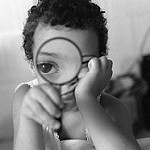Here’s an obvious premise: As we grow from children to adults, we gain proficiency in engaging the world around us. We learn its conventions, assumptions, and physical laws, and we learn to occupy, navigate, and even manipulate those things to our benefit. We learn to dress and feed ourselves, as an example. We operate increasingly complex machinery…beginning with clumsy plastic toys, moving to door handles, then to small-motor marvels like combination locks, and even cognitive/physical juggernauts like smart phones (although many infants can now use smart phones before doorknobs).
Even more than gaining proficiency in the world, however, consider that as we grow, we also perceive a greater number and wider range of “worlds” in which we CAN be proficient. When you’re a toddler, for example, you are subject to your hunger. Hunger controls you. And you can’t begin to imagine that you might have some agency in the interchange. Even after you learn to name it, it still owns you and defines who you are. If you can’t recall that feeling, go explain to a hungry toddler that they have agency over their hunger. Go ahead. I’ll wait…As you grow, however, you begin to understand that feelings of hunger are available for your attention and intention. You can manage the physical/psychological jiu-jitsu of planning for when you will be hungry. You can feel hungry but decide to keep working for a while longer. You are no longer a subject to your hunger. Hunger is an element of your life that you can observe, explore, negotiate, and even manipulate. It may be relentless and persistent at times, but hunger has become an object available for your attention.
Why the tutorial in Constructive-Developmental Theory (which I’ve discussed before)? Well, imagine that this kind of development doesn’t stop when you become an official adult. Imagine that you are ALWAYS inhabiting some worlds in which you recognize some control, and some worlds you can’t even perceive as available to your focused attention. Imagine these worlds include complex social-cultural constructions like workplaces, organizations, schools, communities, or social strata.
Now imagine you work in the world of the arts, where a primary practice is finding, reforming, and reframing elements of ourselves and our environments we don’t even perceive as available to our attention — aspects that have become invisible because they are so commonplace, or energies we feel subject to, that we hadn’t yet recognized as candidates for conversation. Part of your work requirement, therefore, is making this reframing possible for artists, for audiences, for the entire spectrum in between. And part of your self-development task is making sure you’re widening your mind, as well.
Are you subject to your organizational structure? Or is it available for your focused attention and creative inquiry? Are you subject to your organization’s tax status? Or is that also available for critical and creative observation? Are you subject to the conventions of your professional practice or artistic discipline? Or are these conventions also objects that you and your colleagues can observe, discuss, and decide to change?
What if our life’s work isn’t just about becoming more proficient in a wide world, but also more curious and intentional in a widening range of worlds? What if the struggle is to transform whatever we or others feel ‘subject to’ into objects of creative attention? This strikes me as the work of artists (among others), and all who support and connect artistic expression. So perhaps it’s fair game and fertile ground for the arts manager, as well.


